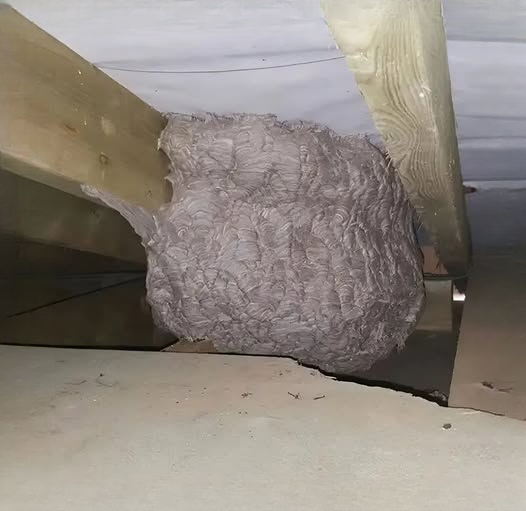In the quiet, windswept hills of Finistère, Brittany, a story was unfolding — one defined by loss, perseverance, and an unexpected encounter with nature’s most formidable invader.
For Denis Jaffré, a former sailor turned beekeeper, life had settled into a gentle rhythm amid the hum of bees and the scent of wildflowers. But that peace was disrupted in 2017, when his hives — the foundation of his livelihood — came under attack from a relentless enemy: the Asian hornet.
These invasive predators, which destroy bee colonies across Europe, wiped out half of Denis’s hives in just a few months. Fifty colonies — gone. The loss wasn’t just financial; it was deeply personal. “You care for them, you watch them build, and then overnight, everything is wiped out,” he said in an interview.
Rather than surrendering to despair, Denis did what problem-solvers do best — he became curious.
He began experimenting in his garage, using scraps of wood, old jars, and nets, determined to design a trap that could capture hornets without harming other insects. Every prototype failed. He adjusted the size, the scent, the materials — until finally, one design worked.
It was simple, elegant, and devastatingly effective.
The trap consisted of two parts: a bait container to lure hornets with a natural scent, and a fabric-covered chamber fitted with narrow entry cones — wide enough for hornets, but too tight for bees and butterflies. Once inside, the hornets couldn’t escape. Other pollinators remained unharmed.
It was precise. It was sustainable. And it worked.
By 2019, Denis’s invention caught the attention of experts. His trap earned a medal at the prestigious Lépine Competition, France’s oldest innovation fair — turning a local beekeeper’s garage experiment into a recognized breakthrough for environmental protection.
With that success came a new mission: to make the device available to beekeepers everywhere.
In 2021, Denis founded Jabeprode, a company built on ecological responsibility and local craftsmanship. What started as a one-man operation in his living room grew into a thriving workshop in Bodilis, a small town in northern Brittany. The 480-square-meter facility now employs seven dedicated staff who hand-assemble the traps with care.
“We’re not just making a product,” Denis explained. “We’re protecting life.”
The results have been remarkable. Within a few years, Jabeprode’s traps reached 18 European countries — including France, Belgium, Spain, Italy, and Germany — with growing interest from the United States, where the Asian hornet has begun to appear. Experts praise the design for its balance of efficiency and ethics: it neutralizes a deadly invasive species without threatening the delicate biodiversity that supports agriculture and ecosystems.
Denis’s invention didn’t just save bees; it restored balance.
And that’s exactly what drives him. As a former sailor, Denis has always felt a deep connection to nature’s rhythms — the sea, the seasons, and now the hum of his hives. He understands that innovation is meaningless if it disrupts the natural order. “We can’t fight one problem by creating another,” he often says. His trap proves that environmental protection and human ingenuity can coexist.
Denis’s mission extends beyond production. He is now promoting education on sustainable hornet control. Often, panicked homeowners and councils resort to toxic chemicals or risky methods to destroy nests. Denis advocates for responsible solutions — including controlled use of sulfur dioxide for nest neutralization, which he says is safer for the environment than widespread chemical spraying.
He has also launched a crowdfunding campaign to expand his workshop, scale production, and meet global demand. Funds will also support research to improve the traps and develop new ecological tools for pollinator protection.
Behind the modest exterior of his operation lies a bigger vision: to change how we respond to ecological crises. Denis believes in empowering individuals — from small farmers to amateur gardeners — to protect biodiversity. “Every person can help,” he insists. “Every trap placed in a garden or near a hive makes a difference.”
His dedication has resonated with environmentalists and agricultural groups alike. Beekeeping associations across Europe credit Denis’s trap with saving thousands of colonies and preventing local honey shortages. Researchers are also studying his design to better understand Asian hornet behavior and develop more species-specific, non-lethal traps.
Yet Denis remains grounded. This isn’t about fame or profit — it’s about giving back to the creatures that once brought him peace. “Bees teach patience,” he says. “They show you that survival depends on working together. I guess I just tried to follow their example.”
The quiet innovation born in his attic now protects thousands of hives. From his workshop in Bodilis, shipments of traps head across Europe every week — small boxes carrying big hope. The once-desperate beekeeper has become an unlikely inspiration, showing how compassion and creativity can turn personal loss into a global solution.
For Denis, success isn’t measured in profits but in pollination — in the hum of life returning to orchards and fields that might otherwise fall silent. “Every time I see bees back at work, I feel like I’ve done something that matters,” he said simply.
His story is a quiet reminder: sometimes a problem — even a “hornet’s nest” in your attic — can become an opportunity. Faced with destruction, Denis chose creation. Faced with loss, he built something that gave life back.
Today, his invention helps save bees across continents. More than that, it’s a testament to one man’s refusal to surrender to despair — and his belief that solutions built with respect for nature are the ones that endure.
In a world full of noise, it is the steady buzz of a healthy hive that still carries the sound of hope.
